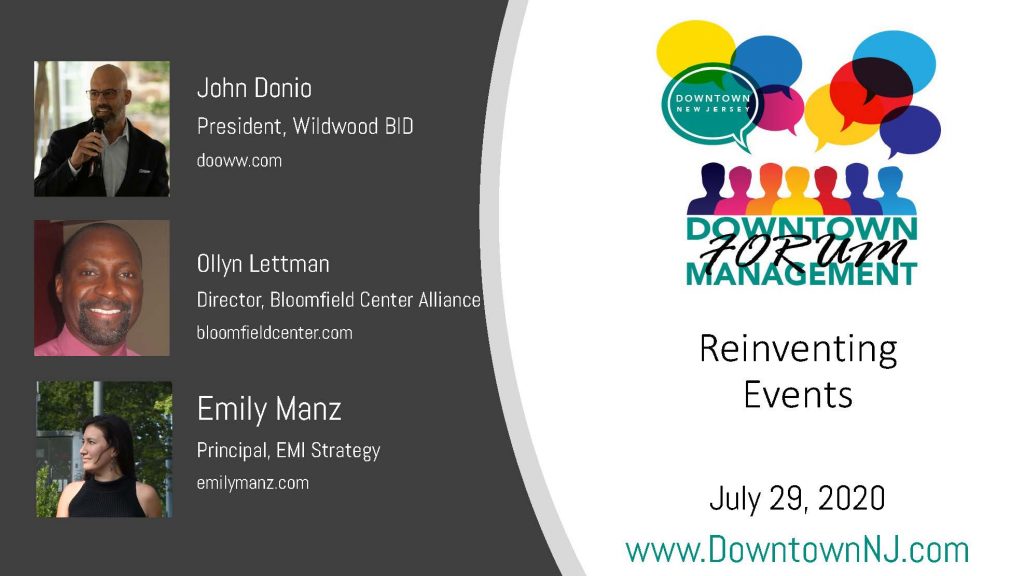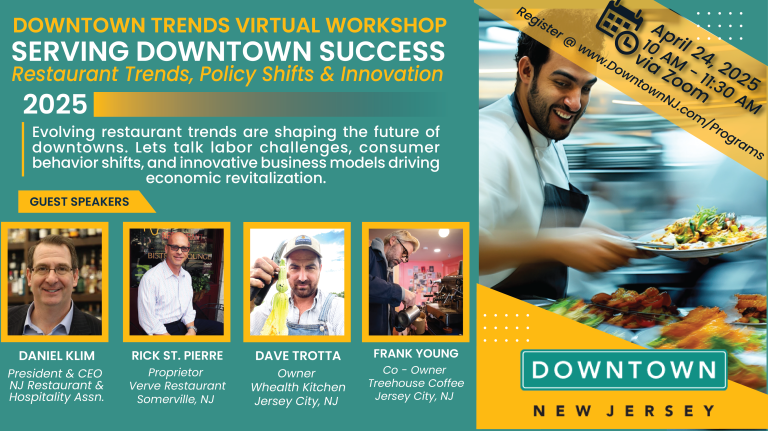Reinventing Events
Courtenay D. Mercer, PP, AICP
Executive Director, Downtown New Jersey
Rachael Thompson Panik
Associate Planner, Mercer Planning Associates
June 29, 2020
Downtown New Jersey is providing a series of virtual opportunities for downtown managers, economic development professionals, and public officials to exchange ideas about best practices related to downtown economic development in light of the COVID-19 crisis.
Events amid the COVID-19 pandemic require a bit more creativity and must be implemented with special care to ensure public safety. At this forum, we were joined by John Donio, President of Wildwood BID, Ollyn Lettman, Director of Bloomfield Center Alliance, and Emily Manz of EMI Strategy who shared their experiences staging in-person and virtual events.
View PowerPoint>
Balanced Approach in Bloomfield
Ollyn Lettman, Director of the Bloomfield Center Alliance (BCA), shared his experience organizing events during the public health emergency. As May approached, the BCA was still in advocacy mode – providing information to business owners, educating shoppers about the best way to shop safely, etc. – but they also began thinking about how to prepare for outdoor events later in the year. They chose to cancel events that were harder to contain, including the very popular Washington Street block party. Two event series they believed to be more manageable were the Cruise Night Car Show and Dinner Under the Stars.Cruise Nights, hosted in partnership with a local car club, allow classic car owners to showcase their vehicles on a public street. Meanwhile, Dinner Under the Stars is an alfresco dining event taking over a prominent downtown street. Local food is accompanied by live music from local bands as guests enjoy their evening under the stars.For both of these events, the BCA and their partners are implementing public safety measures, including:- Signage informing patrons about mask requirements and social distancing expectations.
- Regular announcements over loudspeakers reminding people to socially distance and wear masks when they are not eating.
- Spreading out tables and seating options.
- Portable bathrooms to discourage going inside and hand disinfecting stations nearby.
- Police at each event are helping enforce mask wearing.
- No flyers or pamphlet handouts, instead making use of display stands and encouraging people to take pictures.
- No trophies for the “Best in Show” car during the Cruise night, instead providing gift cards to local businesses and restaurants.
- In the future, they would also like to provide locally branded hand sanitizers, but their typical vendors are entirely sold out of sanitizer.
Reinventing Restaurant Week
Emily Manz, Principal of EMI Strategy, has worked with the Bloomfield Center Alliance for a couple of years on restaurant promotion. Last year, she helped organized the BCA Food Tour. This year, she ran the BCA’s Restaurant Week. The BCA was planning to host typical restaurant week activities – pre fixe menus, indoor dining events, etc. – but had to pivot after it became apparent that the impacts of the pandemic would be long lasting. They hosted the restaurant week very recently, and Emily shared the strategies used to make the event a success.First, downtown organization events should keep the focus on the businesses themselves. While markets and festivals are fantastic for bringing people to downtowns, and they should continue to happen as they can, they do not provide income directly for local businesses. An event like Restaurant Week keeps the focus on meeting the needs of the local restaurants who have been affected by the pandemic.A key to success is offering different kinds of engagement for customers. People’s risk/tolerance levels vary, so steps should be taken to enable people to participate at whatever level they feel most comfortable. Typically, a restaurant week would offer only in-person dining experiences; but this year, the BCA helped restaurants partners with take-out services like GrubHub or UberEats to provide delivery options and also helped restaurants prepare to have curbside pick-up options. They utilized the event website and social media to create engaging activities that could be seen in-person or online. They also promoted participating restaurants through short videos about the business owners and their restaurants – a low-cost, but engaging way to entice patrons.Downtown organizations need to meet restaurant owners where they are – instead of requiring restaurants to have a pre fixe menu, BCA promoted anything that the restaurant wanted, including weekly specials, special menus, or even regular specials. Some of the businesses who had never participated before had fantastic weeks in terms of sales. They were not forced to create anything special to participate, allowing them to join without added stress.Business As Usual (Almost) in Wildwood
John Donio, President of the Wildwood Business Improvement District (BID), shared their experience hosting socially distant events at Byrne Plaza. As a tourism destination, Wildwood needs to capitalize on its relatively short season of peak population in the summer and shoulder seasons. To the best of their ability, they are continuing mainstay events and activities that they do every year, including fitness and yoga classes, classical and jazz orchestra performances, family-friendly movie nights, art strolls, and free concerts. Given all the unrest and uncertainty most everyone is feeling, the BID’s focus is to create fun, highly positive gatherings where people feel comfortable letting loose.The concerts, in particular, draw larger crowds. Wildwood BID has deployed extra staff and volunteers to help ensure social distancing and mask protocols are followed. They use a simple 6-foot jump rope to measure and keep any interactions with guests positive and fun (even when asking them to conform to protocols). Attendees have been very accommodating.Wildwood BID found that video promotions are more impactful than posting still photos on social media. They do not have to be professionally directed and edited – just capture what is happening with a phone and post it.Downtown organizations should be mindful about how much they are spending on these types of events relative to how much business they are generating for local retailers and restaurants. John echoes Emily’s sentiment that these events should be focusing on getting sales for the district’s businesses, as well as providing places for people to safely be outside. He advises seeking out direct and unfiltered feedback from local vendors about how the events are working for them. Organizers should not feel personally hurt when they receive constructive direction from owners; but instead, respond positively to integrate advice and requests. If an event is not working to draw customers to your businesses, don’t be afraid to scrap it and try something else.Discussion and Q&A:
- How are towns and BIDs paying for security, road closure, tables, etc. for the events? Are they sharing costs? Bloomfield pays for security and tables under normal circumstances, so those were baked into the budget already. The town wants to actively support their businesses though, so they set up the permanent barriers on the street to create a large “parklet” area.In Wildwood, they originally were going to do a weekend street shutdown, but the police wanted concrete barriers. Because of the expense and complication of continually moving the barriers, they decided to keep the street shutdown for the entire summer. The town bore the cost of the barrier/shutdown, and the BID beautified the area. While some of the older businesses had reservations about the street closure, many of the newer businesses have relayed increased sales since the shutdown.In New Brunswick, the police wanted to supervise the closures. The DPW drops off the barriers, and the police and restaurants work together to close and reopen streets each evening Thursday through Sunday. The City is using funding from a COVID grant to cover the costs of the police. The BID is covering the cost of musicians, using funds that would have otherwise been used for larger events throughout the year. While foot traffic is down in general because students largely didn’t stay for the summer and major offices are not yet reopened, the closed streets and music are attracting more New Brunswick and nearby town residents that want to enjoy the al fresco dining and entertainment.There are different levels of collaboration happening between towns and BIDs across the state, with some sharing the cost for police and shutting streets down, while others expect the BID to bear all of the expense. Montclair, for example, is paying for the cost of the closure, while the BID is funding beautification. Jersey City is also taking charge of the closures internally, largely so that the city covers liability insurance costs.
- Does anyone have experience with starting a gift card program? Are there established companies who do this type of work? Pompton Lakes has “BID Bucks”, which they print with serial numbers. The customer buys the bucks directly from the BID, and then the vendor gets reimbursed by the BID after customers redeem them at their store/restaurant. A serial stamper can be used to help authenticate the prints.There are also online gift card vendors, such as Giftly. A recent DNJ newsletter article provided some examples of how communities are promoting gift cards.
- The local police are concerned about monitoring/regulating events downtown and are requiring police presence, fence in the area, and having a counting/ticketing system. Is it reasonable to expect crowds of 500 people (NJ outdoor gathering limit)? How are towns providing public restrooms? In Medford, they have a monthly food truck festival. Each individual food truck is considered its own event and falls under the outdoor gathering numbers. They are only monitoring to ensure people are following social distancing protocols.In New Brunswick, since their street closures with music are “casual”, they are not being required to count. If they counted all of the restaurants doing outdoor dining, it would likely exceed 500. But, the restaurants are spread in multiple areas, and no area is exceeding the level. They are also asking restaurants to be conscious that people are seated when they are served (i.e. not serving from a roll out bar to standbys).Bloomfield Center is not seeing the numbers they have in the past, and nowhere close to 500. They hosted a 4th of July BBQ/concert in partnership with Bloomfield College. They used Eventbrite to RSVP for free tickets. 100 people said they would attend, but they ended up with many fewer people. The problem with free events is that people will RSVP but not show up. For any of their events, they are not counting people as they enter – they are using a more casual visual estimate. Ensuring sufficient social distance and mask wearing is a higher priority than regulating the count.
- Thoughts on printed Restaurant Week guides? This year, in particular, it does not seem worth the cost of professional photography, production, and printing. Online options enable it to be more interactive and mobile optimized. Another idea is large posters in prominent areas with QR codes. (A lot of restaurants are using QR codes for their menus now too.)
- JerseyFamilyFun.com is a free online resource to post events.


